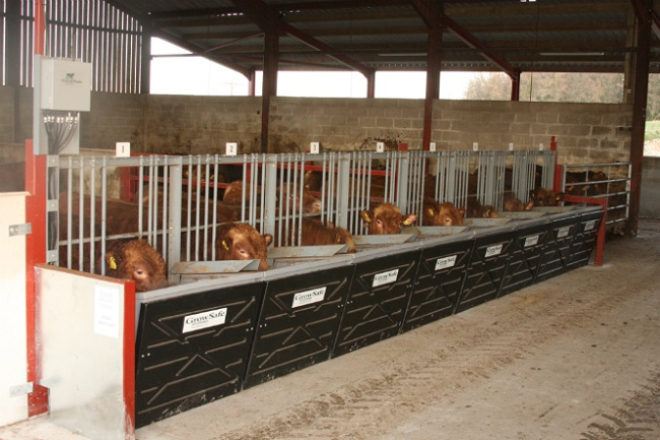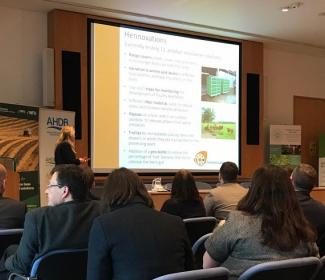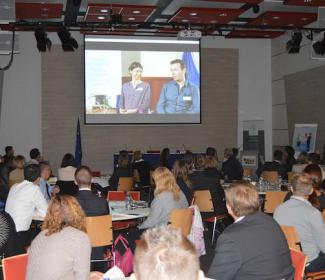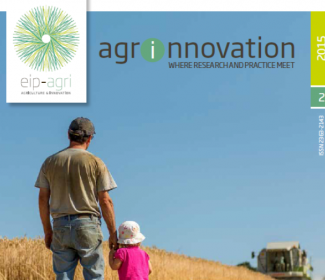Yorkshire farmers' innovation led to success

At a farm visit organised as part of an Agri-Innovation Conference in York, visitors learnt about how a group of farmers in York revolutionised their businesses.
It all started in back in 1990s with a trip to the US. Like many farmers, JSR’s Richard Fuller was struggling to make a profit from his suckler enterprise, needing subsidy for it to stack up. Determined to change this he travelled to the US to investigate a four breed composite cow, the MARC 11 Stabiliser. He had heard that Stabilisers meant more efficient cows and wanted to see for himself.
Impressed by what he saw, he set up the Stabiliser Cattle Company (SCC) with four other beef producers in Yorkshire. And that is when the hard work began. To achieve their aim of continuously improving the economic performance of Stabiliser suckler cows, data on 20 heritable traits needed to be collected accurately and integrated to ensure a balanced breeding programme produced the best possible economic results.
Richard Fuller is clear about the aims. He said:
"We are trying to develop the most profitable suckler cow possible and the best financial results come from having highly fertile, fast growing cattle that are good mothers and produce excellent beef to eat. In the Stabiliser we have a breeding animal that captures all the right traits and makes use of hybrid vigour. Our breeding programme is definitely producing the right type of suckler cow to be profitable in todays market."
This hard work paid off. Twenty years down the line the average profit margin on a Stabiliser suckler cow is £166 whereas the average cow in the AHDB top third is made a £159 loss. And they aren’t stopping there.
The SSC wanted to see if they could reduce feed costs whilst retaining high growth rates and tender beef eating quality. Feed costs make up 60-70 percent of the production variable costs so there was the potential for big savings. They didn’t want to select based on the traditional Feed Conversion Ratio (FCR) value as better FCR figures do not necessarily mean real improvements in underlying biological feed efficiency or profitability and push up mature size – which is not a good thing.
Time for something new
With the help of £1.2m of funding from Innovate UK, the Stabiliser Cattle Company are the first in the UK to develop and implement a Net Feed Efficiency estimated breeding value. Partners in the project included Scotland's Rural College (SRUC), Keenan/ Alltech, Morrisons Supermarket.
Using the Net Feed Efficiency effectively in the breeding programme could save £80-£100 per year per cow in feed costs. There is a big difference in feed efficiency between individual animals within all breeds and it is a moderately heritable trait (0.37) so it is therefore possible to select genetically superior bulls, cows, heifers and steers, provided you know which are the best performers.
To develop the Net Feed Efficiency EBV in the breeding population the SCC have set up a commercial test facility in East Yorkshire, using GrowSafe technology. This technology allows individual feed intakes to be measured in group housed bulls. Each bull is uniquely identified by an RFID tag.
Every meal the animal has is recorded through measuring the disappearance of feed form a bin mounted on weigh cells. Resolution is to +/- 3 grams. The data is then transmitted wirelessly to the computer.
This data is then processed alongside animal growth data to calculate an individual animal Net Feed Efficiency breeding value. This in turn is used by geneticists to create genetic selection tools based on an economically weighted Index.
Duncan Pullar is the technical Manager for SCC and he sees the benefit of the NFE work:
"The Innovate project has run very well from our point of view. The partners have all done a good job, we have evaluated over 1000 animals through the unit and we now have a fully functioning NFE EBV. After the project we will continue to evaluate our potential breeding bulls to ensure we make further progress with the NFE trait. Doing that will benefit all our Stabilisers customers now and on into the future."
For more information see the Stabiliser Cattle Company Website





